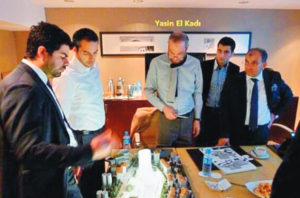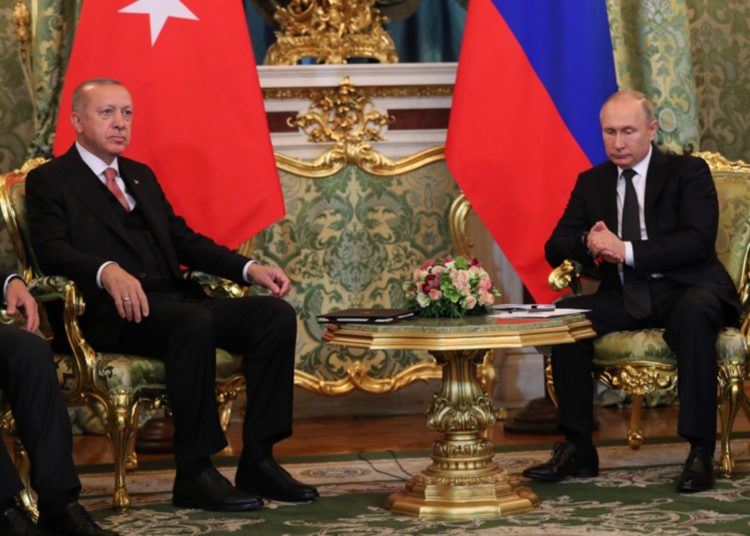Abdullah Bozkurt/Stockholm
Having gained experience in sanctions busting schemes that undermined both US and UN Security Council embargoes on jihadist groups and Iran in the past, the government of Turkish President Recep Tayyip Erdoğan is now poised to implement a similar playbook for Western sanctions on Russia.
Hoping to make money for his business cronies and aid his country’s embattled economy and finances, Erdoğan apparently saw the opportunity to make a profit by offering Russians a lifeline to help overcome the restrictions and beat the sanctions.
“With the Ukraine crisis, our country has become a rising star in sectors such as finance and tourism. By God’s will, we will fulfill our promise to make our country one of the world’s top 10 economies by making the best use of opportunities,” Erdoğan said on March 21 while addressing former lawmakers from his ruling Justice and Development Party (AKP)
“We will continue to march towards our goals,” he added.
Turkey is the only NATO ally that did not close its airspace to Russian aircraft, and many Russians have in recent weeks flocked to Turkish banks to open accounts and stash their cash. Since the invasion of Ukraine started last month, Turkish government officials have repeatedly said they will not join the sanctions regime on Russia.
Turkish president’s speech on March 21, 2022 during which he talked about opportunities in the Russia-Ukraine war:
It is not just the leverage Moscow has over Turkey in a number of areas including Syria, nuclear power plant construction and tourism, but rather President Erdoğan’s ambitions to make a profit that are driving Turkish government policies.
Erdoğan personally dispatched his close business associate, Ethem Sancak, to Russia to deliver a message to Russian officials. Accompanied by a delegation from Erdoğan ally the Homeland Party (Vatan Partisi, formerly known as the Labor Party), Sancak reportedly discussed ways and means to help Russia amid the sanctions.
He later turned up on Russian TV station RBC and gave an interview with all the talking points Russians like to hear. He reaffirmed that Turkey won’t be joining in the sanctions, lashed out at NATO, praised Russia and pleaded ignorance of past armed drone sales to Ukraine.
“Turkey’s membership in NATO is a shame that it has been carrying throughout its past,” he said, claiming that NATO was involved in all military coups in Turkey including one on July 15, 2016 and that it wanted to oust Erdoğan from power.
He assured the Russian side that Turkey would be implementing the Montreux Convention to the benefit of Russia. When asked about the Bayraktar armed drones sold to Ukraine by Baykar, a company owned by the family of President Erdoğan, Sancak claimed they did not know the drones would be used against Russian troops and ruled out any future drone deliveries to Ukraine.
“There will be no further promotion of the transatlantic alliance here. If Russia falls, Turkey falls,” Sancak said, accusing the West of trying to spoil relations between Turkey and Russia. He branded NATO as a cancer and a tumor.
Sancak, who sits on the ruling Justice and Development Party’s (AKP) executive board, has enriched himself through government contracts and tenders granted by President Erdoğan in no-competition bids. He is described as one of the Turkish oligarchs who manages the wealth of President Erdoğan and acts as a trustee for the massive wealth of the Turkish president.
This is not the first time Erdoğan has used Turkish institutions to derail US and/or UN sanctions. He helped Yasin al-Qadi, at one time designated an al-Qaeda financier by both the UN Security Council and the US Treasury, to move funds to Turkey, illegally enter the country and establish business ventures. Erdoğan’s son Bilal was a partner in business schemes financed by al-Qadi, who traveled to Turkey many times, once on board the presidential plane.
Ethem Sancak’s interview on Russian TV:
Al-Qadi and Bilal were leading suspects in a corruption investigation pursued by prosecutors in Istanbul and were the subjects of detention warrants issued on December 25, 2013 by the prosecutors. However, Erdoğan stepped in, illegally preventing the execution of the warrants by ordering the police to ignore the prosecutors’ orders. After the removal of the prosecutors and police chiefs who were involved in the investigation, Erdoğan managed to whitewash the crimes of his associates.
In another instance of a sanctions-busting scheme, Erdoğan helped Turkish-Iranian national Reza Zarrab, who bribed senior government officials including cabinet ministers and cultivated personal ties with the Erdoğan family. The graft scheme was made public on December 17, 2013. Dozens of suspects including Zarrab were detained and later arrested for violating several Turkish laws.
Erdoğan, who was incriminated in the probe, stepped in to derail the prosecution and helped release all the suspects after orchestrating the removal of the lead prosecutors and investigators in the case. All suspects including Zarrab were later acquitted by new judges who were brought in to hear the case by the Erdoğan government.
However, Zarrab was arrested by the FBI in Miami in 2016 and charged by the US Attorney for the Southern District of New York with engaging in hundreds of millions of dollars’ worth of transactions on behalf of the Iranian government, money laundering and bank fraud. He cut a deal with prosecutors and decided to cooperate in a US federal case that exposed the role of Erdoğan, who had instructed Turkish state banks to participate in the multi-billion-dollar scheme in exchange for kickbacks.
Erdoğan is apparently gearing up to exploit opportunities in the Russian-Ukrainian conflict and hopes to make some money in the process with a secret deal he struck with the Russian government. There are indications that the deal is already underway.

This week, two luxury yachts and a business jet belonging to Russian oligarch Roman Abramovich, sanctioned by the West, arrived in Turkey. Abramovich’s $700 million yacht, the Eclipse, and the $600 million My Solaris, arrived Turkey’s western resort cities of Bodrum and Marmaris, while a jet owned by Abramovich landed in Istanbul on Monday.
Abramovich’s travels to Turkey and efforts to move his assets to safety in order to avoid UK and EU sanctions had to be be approved by the Erdoğan government in advance considering the controversy surrounding the Russian oligarch in recent weeks.
In fact, when a group of people in Bodrum protested and tried to prevent My Solaris from docking at the port to take on fuel and supplies, they faced a crackdown by Turkish authorities.
Igor Sechin, another Russian billionaire and head of Russian oil company Rosneft, also turned his eyes to Turkey. As soon as the sanctions hit, he ordered the captain of the Amore Vero, a $116 million yacht, to leave a French port and sail to Turkey as quickly as possible. However, French customs officers managed to seize the luxury yacht before it had the opportunity to embark on the voyage to Turkey.
Russian steel magnate Viktor Rashnikov, also sanctioned by the EU, has a large investment in Turkey and forged close ties with the Erdoğan government. His company Magnitogorsk Iron and Steel Works (MMK) owns Turkish-based subsidiary MMK Metalurji, which operates a plant in southeastern Turkey.
Russian energy giant Lukoil’s president Vagit Alekperov, another multi-billionaire oligarch, also has business interests in Turkey and owns the Edition and Palmarina hotels as well as the Akpet oil distribution chain.












